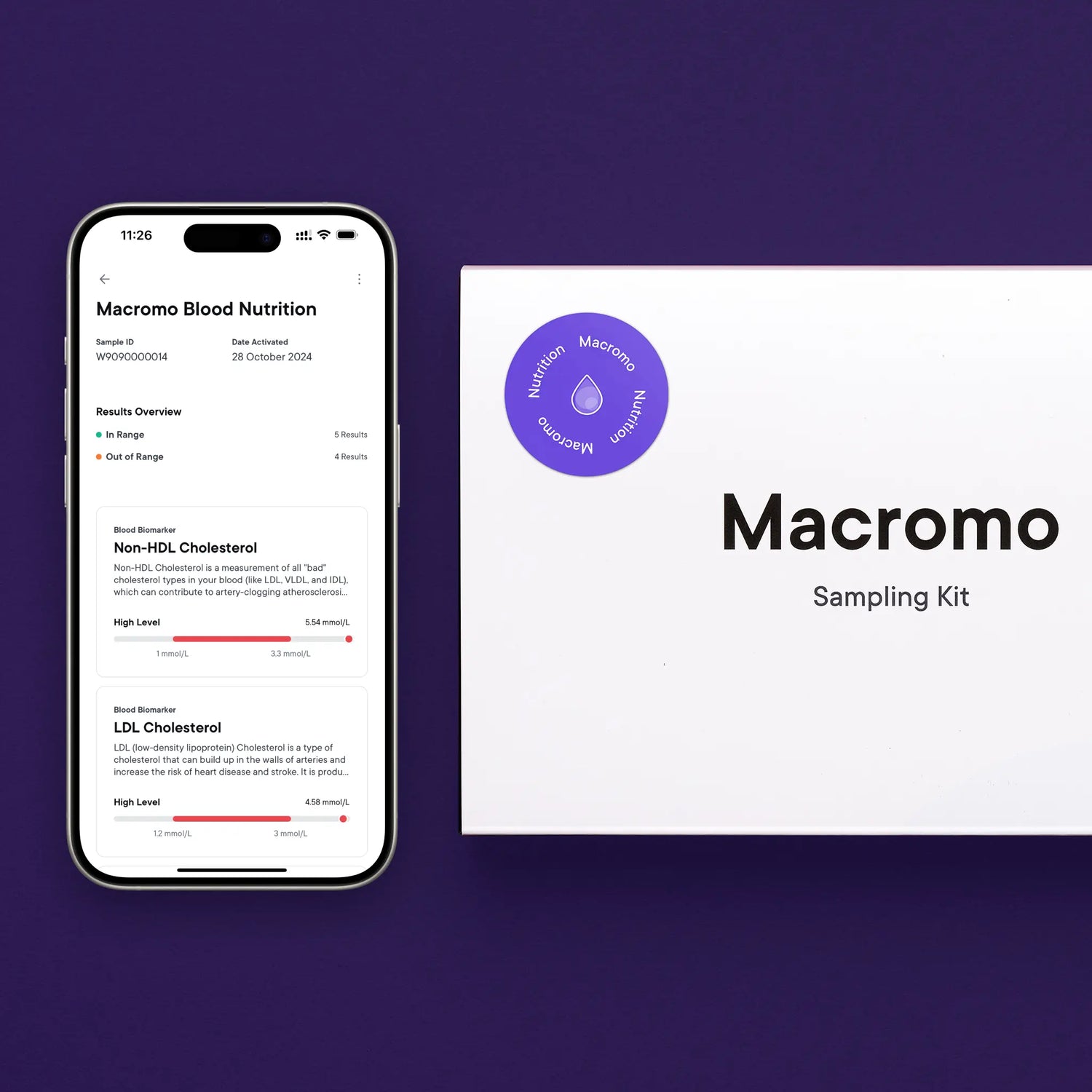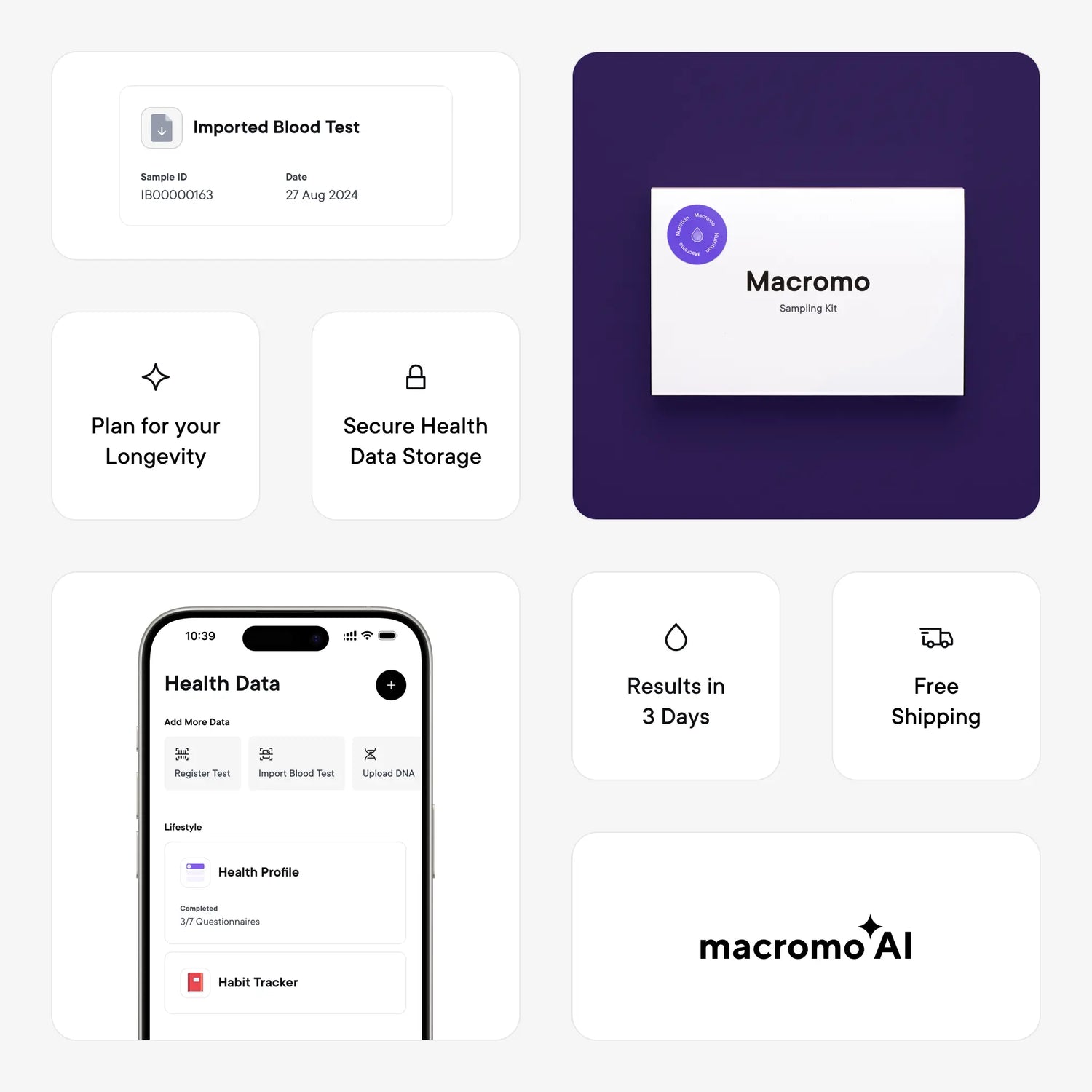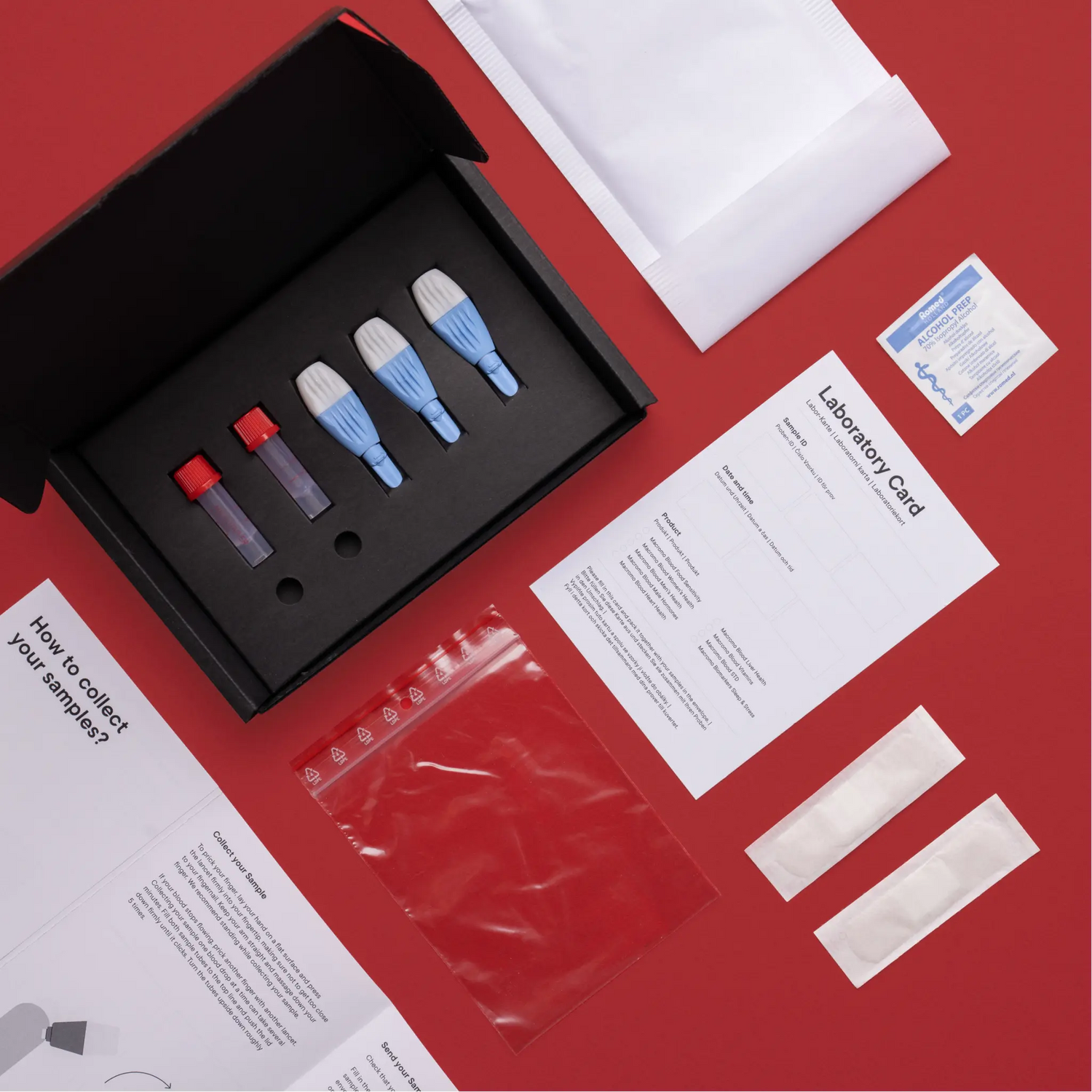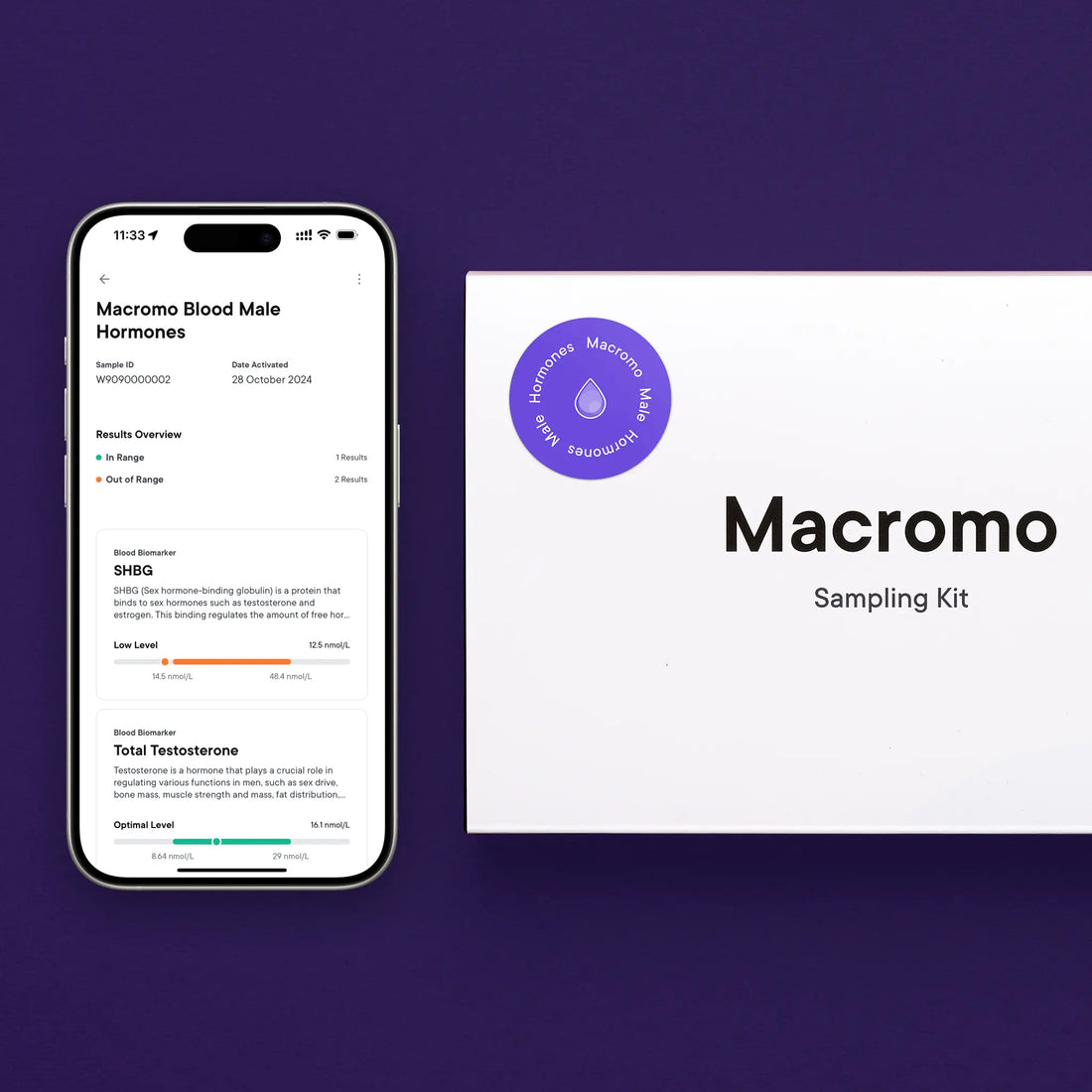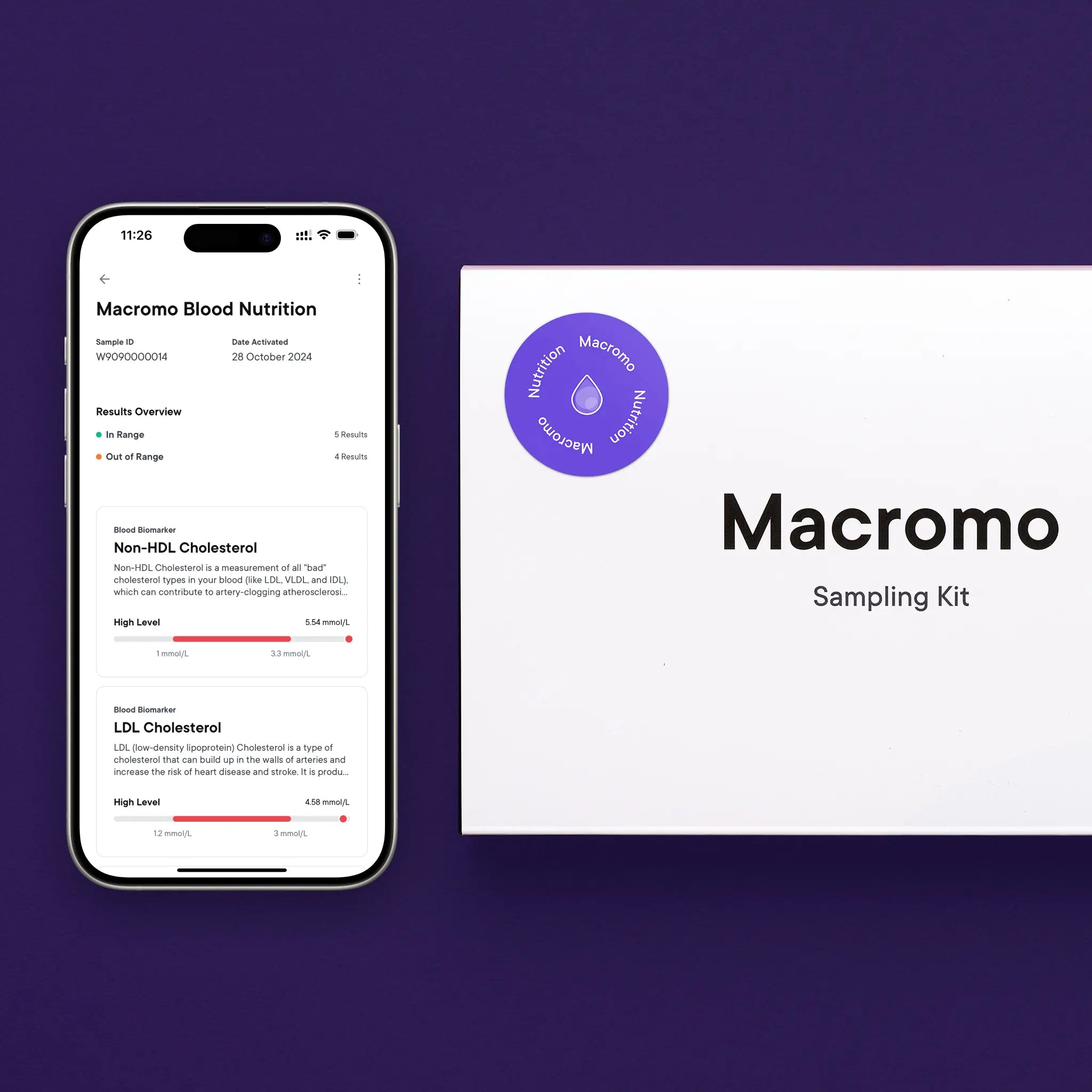
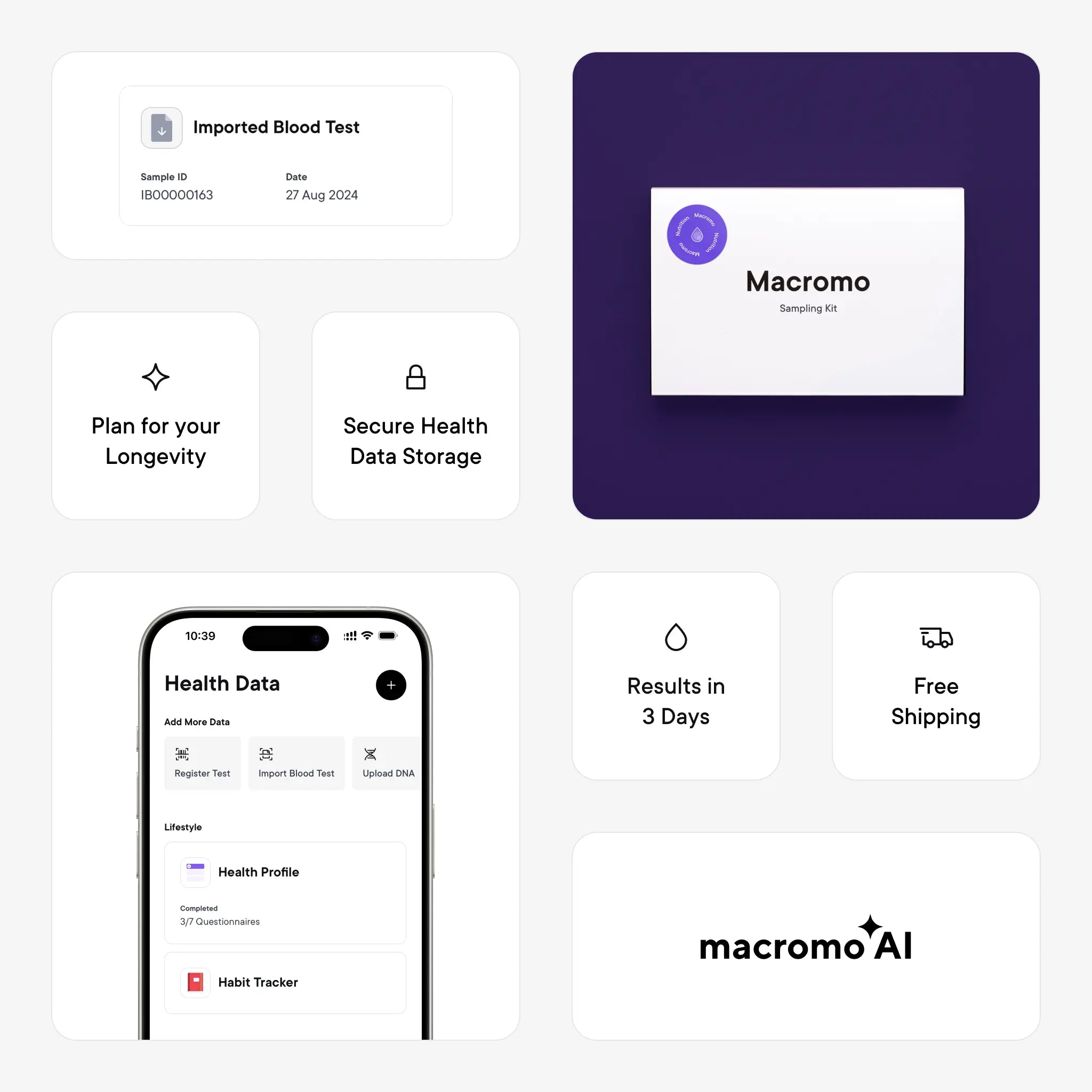
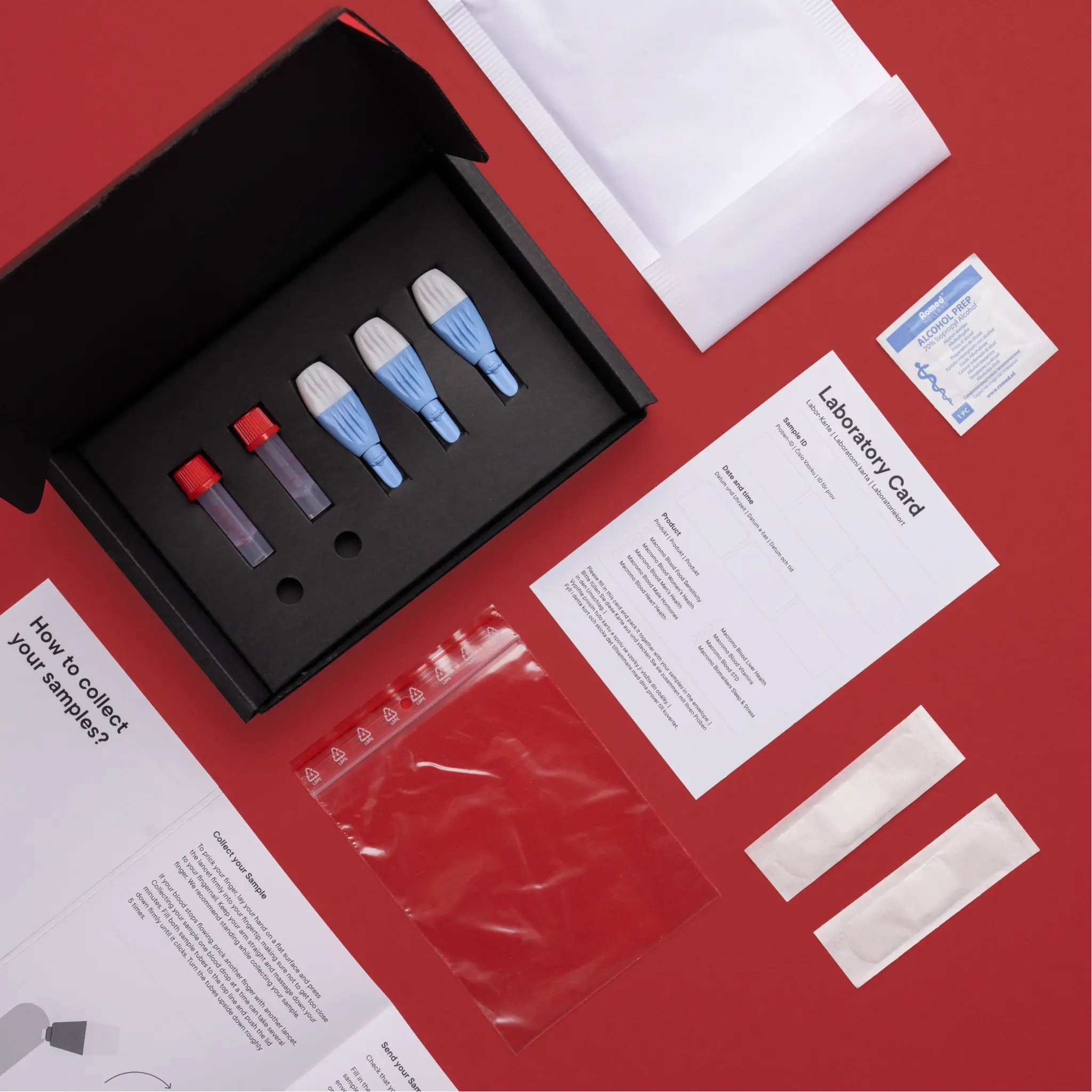

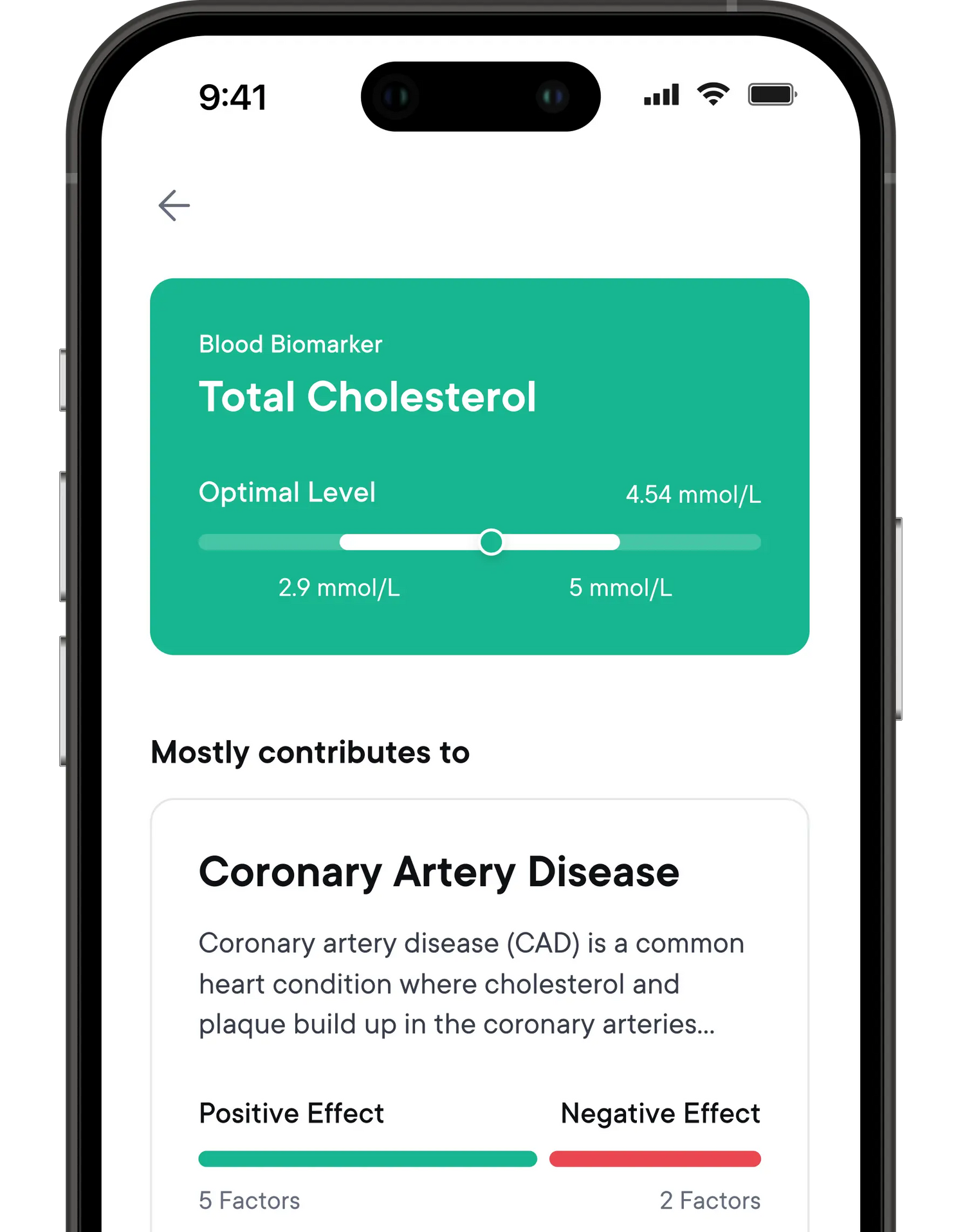
Meaningful Insights into your Health
Early Detection of any Irregularities
Timely interventions through lifestyle adjustments will help you live a healthy life and avoid future health problems.
Easy-to-understand Results
You get all your results in a Macromo mobile app which connects all your health data on one place and provides personalized recommendations for your healthier lifestyle.
Long-term Monitoring of Key Biomarkers
To understand how your lifestyle affects your health, Macromo allows you to monitor overtime trends of your key health markers.
10 key nutrition-related biomarkers for your good health
Your diet plays a significant role in your overall health. By monitoring these biomarkers you will get an assessment of how your diet contributes to your healthy living, and if you have any deficiencies in your diet which you can fix by optimizing what you eat or the right supplements.
Total Cholesterol
Cholesterol is a fat-like substance found in the blood that is essential for the normal functioning of the body. It is the sum of HDL ("good") cholesterol and LDL ("bad") cholesterol in the blood, which can build up in the arteries and increase the risk of heart disease.
Cholesterol
Elevated Level
HDL
Optimal Level
HDL
HDL (high-density lipoprotein) cholesterol is often known as the "good" cholesterol. It helps transport cholesterol away from the blood, returning it to the liver, which keeps arteries clear and blood flowing smoothly. Higher levels of HDL cholesterol are desirable for maintaining good heart health.
LDL
LDL (low-density lipoprotein) cholesterol, often called "bad" cholesterol, can build up in your arteries, reducing blood flow and potentially leading to heart attacks or strokes. Managing your LDL cholesterol levels is essential for safeguarding your heart and overall health.
non-HDL cholesterol
Non-HDL cholesterol is an even better risk indicator than LDL-c alone, as it includes all harmful cholesterol particles and is a key indicator of heart disease risk. Elevated levels are associated with increased cardiovascular risk. A heart-healthy diet, focusing on whole foods and limiting unhealthy fats, helps manage non-HDL cholesterol, contributing to overall heart health.
Triglycerides
Elevated triglycerides are a key risk factor for developing heart disease by contributing to the development of arterial plaque and atherosclerosis. Triglyceride levels are influenced by diet, with a high intake of saturated fats and refined carbohydrates increasing their levels. Conversely, a balanced diet, rich in omega-3 fatty acids and fiber, can help regulate triglyceride levels, mitigating this risk and promoting overall cardiovascular well-being.
Vitamin D
Vitamin D plays a pivotal role in maintaining strong bones and supporting immune function. You can naturally produce it in your skin when exposed to sunlight or obtain it from dietary sources such as oily fish, red meat, liver, and egg yolks. Fortified foods and dietary supplements are also reliable options to ensure you get your essential dose of vitamin D.
Vitamin B12
Vitamin B12, or cobalamin, is crucial for nerve health, red blood cell formation, and efficient metabolism. Ensuring an adequate intake of vitamin B12 helps prevent fatigue, anemia, and neurological problems. You can primarily find this essential vitamin in foods of animal origin, including fish, meat, poultry, eggs, and dairy products.
Transferrin
Transferrin, a vital glycoprotein in the blood, regulates and transports iron throughout the body. Its primary role is to bind to iron, ensuring its safe delivery for essential physiological processes, including the formation of hemoglobin. Transferrin plays a crucial role in supporting overall health by facilitating proper iron transport, preventing iron-related disorders such as anemia, and contributing to overall well-being. Transferrin levels are influenced by dietary intake of iron-rich foods such as red meat and poultry, fish, beans, lentils, or tofu.
Ferritin
Ferritin is a key intracellular protein that stores and releases iron in response to the body's needs. It plays a crucial role in maintaining iron balance and preventing iron deficiency or excess. By storing iron in a soluble and non-toxic form, ferritin ensures a controlled and accessible supply for essential cellular functions. Ferritin levels are influenced by dietary intake of iron-rich foods such as red meat and poultry, fish, beans, lentils, or tofu.
Magnesium
Magnesium is an indispensable mineral, that actively contributes to muscle and nerve function, contributes to bone strength, and aids in energy metabolism. Sources of magnesium abound in leafy vegetables, nuts, and whole grains, making it essential to incorporate these foods into your diet.
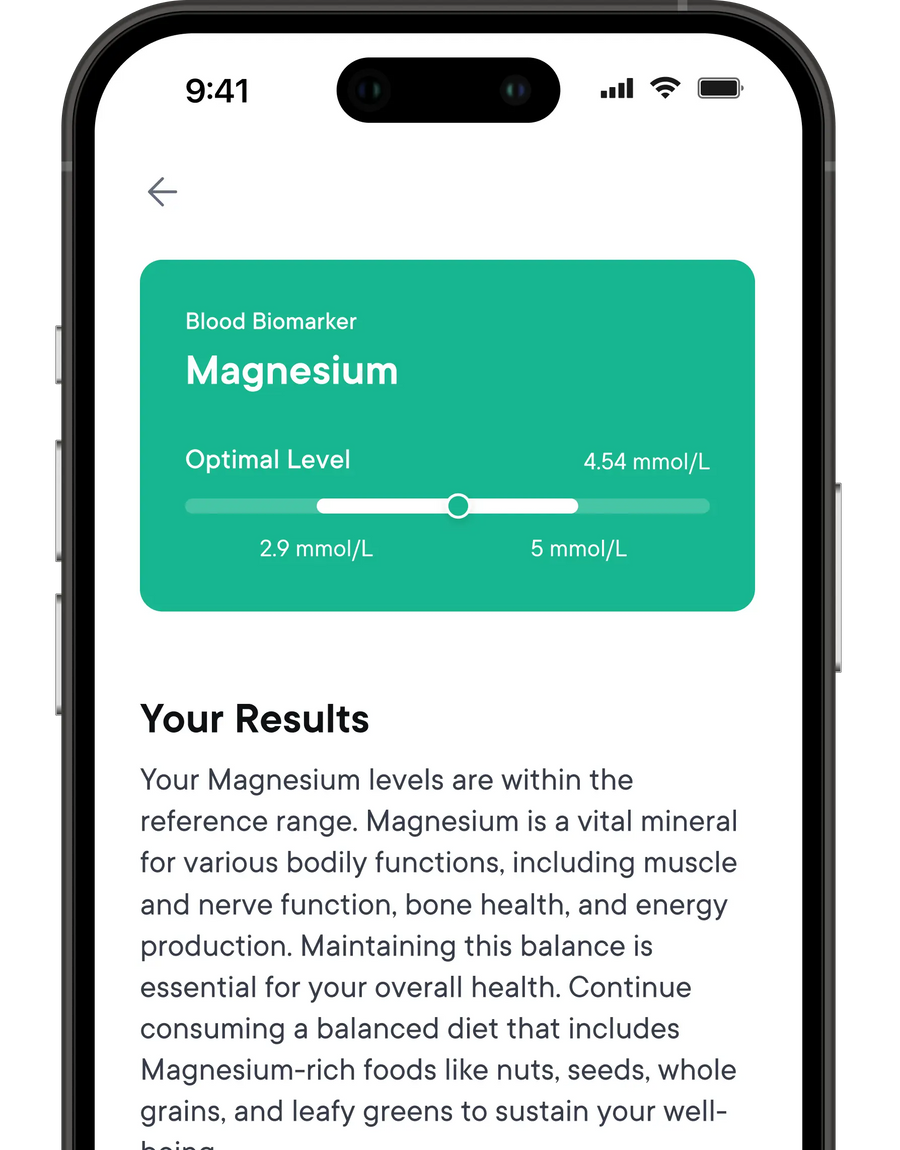
Ing. Michal Pohludka Ph.D., MBA, LL.M.
Biochemist with a PhD in molecular pathology, co-founder of Macromo.

Results Guaranteed by Experts
Prevention Guaranteed by Experts
The Macromo blood test has been carefully compiled by a team of experienced doctors and healthcare professionals who have carefully selected and included specific biomarkers that provide valuable information about your health.
Certified Clinical Laboratory
We partner with top diagnostic laboratories to provide quality laboratory analysis used by physicians from primary care providers to teaching hospitals.
Frequently asked questions
When will I get my results?
Results will be displayed on the Macromo mobile app within five business days of when we receive your sample.
Is the blood draw painful?
It is not. The blood draw is performed via a tiny puncture of an automated lancet into the belly of the finger, from which the blood is then collected into a tube. The puncture site may be slightly sensitive after the collection.
What if I fail to draw blood?
If you fail to collect enough blood, the sample cannot be tested and you will need to repeat the collection. In this case, please contact us and we will send you a new collection kit free of charge.
How quickly do I need to get the sample to the lab?
Once you have taken a blood sample at home, it is important to send it to the laboratory as soon as possible. Ideally, this should be done within 24 hours of collection. Biological material can begin to degrade over time, which can affect the accuracy of the test. Therefore, it is important to follow the instructions for the use of the kit carefully and deliver the sample to the laboratory promptly using prepaid shipping from PPL.
To avoid shipping complications, we recommend NOT sending samples on Friday afternoon or before a public holiday. Please note that if the sample degrades due to late shipment, it is considered the customer’s responsibility.
Why might my blood test results vary between different labs?
It’s important to understand that while all laboratories aim to deliver the most accurate results, variations between labs can occur. This is due to several factors, such as differences in the methods used to analyze samples, the precision of the equipment, the calibration of machines, and even how the samples are handled and stored. This does not necessarily mean that one lab’s results are wrong and another’s are right. Instead, it means that there might be slight differences between results due to these variable factors. To ensure consistency in our at-home testing service, we use a single lab to process all samples. This allows us to maintain control over many of these variables and provide you with the most consistent and reliable results possible.
Are there any medical conditions or medications that might make it unsafe to use this at-home blood test kit?
There are several medical conditions and medications that could potentially pose risks when using our at-home blood test kit. If you have a condition that affects blood clotting, such as a blood clotting disorder or if you're taking anticoagulant medication (blood thinners), we advise against using the kit. Similarly, individuals with blood-related disorders like hemophilia, other bleeding disorders, or a history of fainting with needle sticks or blood draws should also exercise caution. Additionally, those with poor peripheral circulation, such as individuals with diabetes or Raynaud's disease, may encounter difficulties in obtaining an adequate sample. If you are unsure about your condition it's best to consult with your healthcare provider to determine if an at-home blood test is suitable for you based on your specific medical circumstances. Our at-home blood test kit is designed for convenience and to supplement your regular health checks, but it's crucial that it's used safely.
What should I do if I use the at-home blood test kit and experience prolonged bleeding or bruising?
If you experience prolonged bleeding or significant bruising after using the at-home blood test kit, please seek immediate medical attention. It's important to note that these symptoms could be signs of an underlying condition that affects your blood's ability to clot, and you should discuss this with your healthcare provider. If you are experiencing an emergency, please dial the local emergency number right away.


